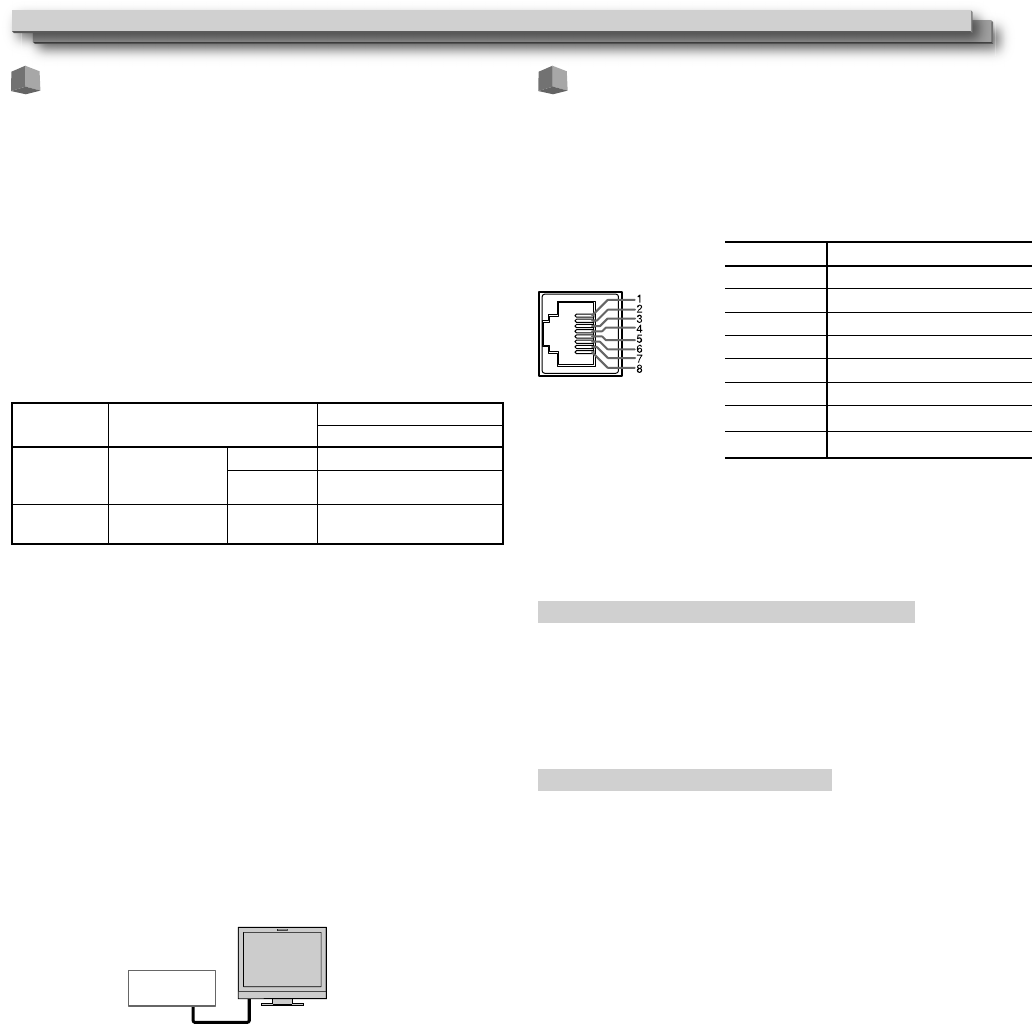
23
About the external control
This monitor has three external control terminals.
● MAKE/TRIGGER terminal (RJ-45): The following external control
systems are available.
(1) MAKE (make contact) system:
Controls the monitor by short-circuiting the corresponding pin
terminal to the GND pin terminal, or disconnecting (opening) it.
(2) TRIGGER (trigger) system:
Controls the monitor by sending the pulse signal instantaneously
to the corresponding pin terminal.
☞ “Using the MAKE/TRIGGER system”on the right
● RS-232C terminal (D-sub 9-pin): Controls the monitor with the
RS-232C system. (☞ “Using the serial communication” on page 24)
Set the following items of “Remote Setting” in Set-Up Menu
according to the external control terminal and control system. (☞
“Parallel Type” on page 20)
Control
terminal
Control system
The settings of this unit
“Parallel Type” setting
MAKE/
TRIGGER
terminal
Parallel Type MAKE Make
TRIGGER Trigger
RS-232C
terminal
Serial
communication
RS-232C —
*
1
For a monitor connected to a personal computer etc, select the
terminal the equipment is actually connected to.
“MAKE” takes precedence over other controls.
● You can use external control even when “Control Lock” is set to
“Volume Lock” or “All Lock”. (☞ page 20)
● When the monitor is off (on standby), external control is not
available. But certain external controls (starting/terminating
communication, turning on the monitor) are available through the
serial communication. (☞ page 25)
<MAKE/TRIGGER system>
You can control the monitor by a personal computer or dedicated
controller*
2
.
● “Using the MAKE/TRIGGER system” on the right.
*
2
The controller is not commercially available. Consult your dealer if
you need it.
<Serial communication>
● For the details, see page 24.
PC, etc.
External Control
Using the MAKE/TRIGGER system
The MAKE/TRIGGER terminal is configured as follows. You can assign
a function to each pin terminal in “Remote Setting”. (☞ “Pin1, Pin2,
Pin3, Pin4, Pin5” in “Parallel Type” on page 20)
● You cannot change the functions assigned to the pin terminals
from 6th to 8th.
Pin No. Pin name
1 Pin1
2 Pin2
3 Pin3
4 Pin4
5 Pin5
This is a female terminal. 6 Tally*
1
7 Enable*
2
8 GND
*
1
The 6th pin terminal controls turning on or off the tally lamp
(available to control even when the 7th pin terminal is invalid).
*
2
The 7th pin terminal makes the external control valid/invalid. Keep
the 7th pin short-circuited to 8th pin to make the external control
valid
To assign the functions to the pin terminals
For the operation procedure, see page 12.
1 Select “Remote Setting” on the Set-Up Menu.
2 Set “Parallel Type” to “Set.”
3 Select a pin name (“Pin1” – “Pin5”) for which you want to assign a
function, then select the function you want to assign.
For the selectable functions, see the table on page 24.
Operation of the external control
1 Set “Parallel Type” of “Remote Setting” to “Make” or “Trigger” in the
Set-Up Menu.
2 Keep the 7th pin terminal (Enable) short-circuited to the 8th pin
terminal (GND) so that the monitor can be controlled by the external
control.
3 When the “MAKE” system is selected: Operate each function by short-
circuiting the corresponding pin terminal to the 8th pin terminal
(GND) or opening it.
When the “TRIGGER” system is selected: Operate each function by
pulse control, that is short-circuiting the corresponding pin terminal
to the 8th pin terminal (GND) for about 1 second and opening it.
● When changing the input with MAKE system, activate the pin you
want after deactivating the currently used pin.
● When selecting the “TRIGGER” system, you can operate only one
function at a time. Operate the functions one by one.
RS-232C
DT-V9L5_EN_1.indb 23DT-V9L5_EN_1.indb 23 10/10/2012 5:18:55 PM10/10/2012 5:18:55 PM


















